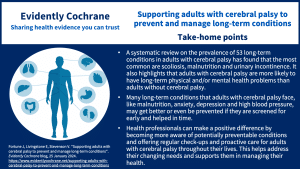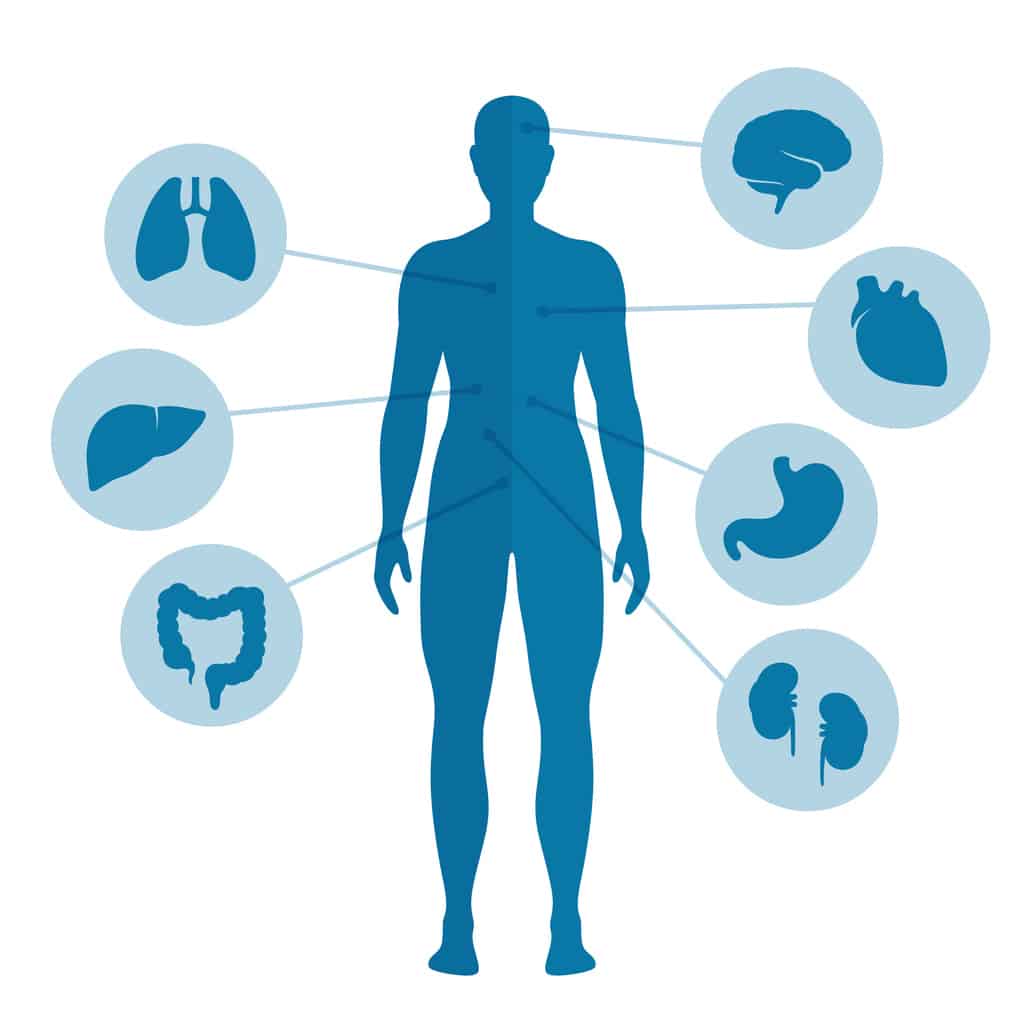In this blog for health professionals, Dr Jenny Fortune [researcher], Emma Livingstone [CEO and Founder Up the Adult CP Movement] and Dr Valerie Stevenson [Neurologist and lead of the UCLH Cerebral Palsy Service] look at the occurrence of long-term conditions in adults with cerebral palsy and discuss how health professionals can use this information to support adults with cerebral palsy manage their health.
Take home points

Adults with cerebral palsy can face particular challenges when it comes to living well with the condition. Health professionals can make a positive difference in supporting them to do this. Whilst adults with cerebral palsy are more likely to have and develop long-term conditions, early detection and interventionA treatment, procedure or programme of health care that has the potential to change the course of events of a healthcare condition. Examples include a drug, surgery, exercise or counselling. have the potential to prevent or improve some of these conditions. Good information and awareness are crucial to empower adults with cerebral palsy to make informed choices and to ensure health professionals can effectively support them in managing their health.
Making informed choices about living well with cerebral palsy
Seventy-five per cent of people with cerebral palsy are adults. Cerebral palsy is caused by a problem with the brain that happens before, during, or shortly after birth. Although the injury to the brain stays the same, the way cerebral palsy impacts a person can change over time. As adults with cerebral palsy get older they have ongoing health needs and may also have long-term conditions like scoliosis, malnutrition and mental health difficulties.
There is an opportunity to enhance the health of adults with cerebral palsy by finding better ways to prevent and lessen the risks of long-term conditions and their impacts.
Emma comments: “One of the main reasons I launched UP – The Adult Cerebral Palsy Movement nearly 6 years ago was to gain a better understanding of the experiences of adults living with cerebral palsy. I believed that by understanding the challenges and opportunities faced by adults with cerebral palsy, I could help myself and others make informed choices about living well with the condition.
Thankfully, today we have more research available about long-term conditions in adults with cerebral palsy, which reinforces what I hear from our community. However, it can be hard for adults with cerebral palsy, health professionals, and policymakers to find the most important health messages. As CEO of UP, it is vital that I have access to rigorously synthesised dataData is the information collected through research. to make our case to government for increased resources and equitable health care for adults with cerebral palsy”.
How common are long-term conditions in adults with cerebral palsy?
We wanted to find out how common long-term conditions are among adults with cerebral palsy and see if adults with cerebral palsy are more likely to develop long-term health conditions than adults without cerebral palsy.
We did a systematic review of the prevalence and incidence of long-term conditions among adults with cerebral palsy (September 2023), and looked at 65 studies from around the world which explored 53 different long-term conditions.
The most common health conditions were:
- scoliosis (46.3%)
- malnutrition (38.3%)
- urinary incontinence (32.4%).
More than 15% of adults had:
- epilepsy
- high blood pressure
- asthma
- anxiety
- depression
- obesity
- constipation
- underweight
- gastroesophageal reflux disease
- osteoarthritis
- hypothyroidism
Only a quarter of these studies were high quality, so we don’t have strong confidence in these estimates.
Some groups within the populationThe group of people being studied. Populations may be defined by any characteristics e.g. where they live, age group, certain diseases. of adults with cerebral palsy had a higher rateThe speed or frequency of occurrence of an event, usually expressed with respect to time. For instance, a mortality rate might be the number of deaths per year, per 100,000 people. of certain long-term conditions.
Those who use wheelchairs had higher rates of:
- pressure ulcers
- being underweight
- malnutrition
- constipation
Adults with intellectual disability had higher rates of:
- epilepsy
- pressure ulcers
- being underweight
- dementia
- high blood pressure
- constipation
However, there haven’t been many studies on the health of different groups of adults with cerebral palsy. Most of the information comes from single studies, so there isn’t clear evidence that certain groups of people with cerebral palsy are more likely to have certain conditions.
Adults with cerebral palsy are more likely to develop long-term health conditions
There was consistent evidence that adults with cerebral palsy were more likely than adults without cerebral palsy to develop long-term conditions.
Compared with adults without cerebral palsy, adults with cerebral palsy were around six times more likely to get:
- osteoporosis
- cerebrovascular disease
Plus, about twice as likely to get:
- heart failure
- ischaemic heart disease
- asthma
- chronicA health condition marked by long duration, by frequent recurrence over a long time, and often by slowly progressing seriousness. For example, rheumatoid arthritis. kidney disease
- high blood pressure
- osteoarthritis
- anxiety
- depression
Adults with cerebral palsy were also more likely to have:
- type 2 diabetes
- bipolar disorder
- schizophrenia
- liver disease
- underweight
There was no evidence suggesting that adults with cerebral palsy were more likely to get cancer, COPD, dementia, or inflammatory musculoskeletal diseases than adults without cerebral palsy.
As a health professional, how can I use this information to better support people with cerebral palsy?
One of the key challenges faced by both adults with cerebral palsy and health professionals is a lack of understanding about how cerebral palsy can affect health across the lifespan, like the higher riskA way of expressing the chance of an event taking place, expressed as the number of events divided by the total number of observations or people. It can be stated as ‘the chance of falling were one in four’ (1/4 = 25%). This measure is good no matter the incidence of events i.e. common or infrequent. of certain health issues. This knowledge gap can make people less likely to get the health care they need to stay healthy and can get in the way of efforts to lower the risk of long-term conditions and improve overall health.
Although this review cannot tell us why conditions such as heart disease and osteoporosis are more common in people with cerebral palsy we can extrapolate from other studies that it is likely due to common risk factors for long-term health conditions. Although rates of smoking and alcohol consumption are generally lower in people with cerebral palsy, unhealthy diet, poor sleep and reduced physical activity are more common. Additionally, higher rates of pain, fatigue and declining mobility for people with cerebral palsy are all known to influence the rate of mental health disorders such as anxiety and depression.
Understanding these risk factors will help empower people living with cerebral palsy to try and mitigate the risks and live healthier lives. However, it is also important to raise awareness in healthcare professionals who play key roles in providing information, ensuring risk factors for long-term conditions are modified and barriers are overcome in enabling people with cerebral palsy, especially those with mobility or intellectual impairment, to access appropriate health screening and promotion programmes.
What structural changes are needed within the system to support people with cerebral palsy?
Common health problems in adults with cerebral palsy, like malnutrition, anxiety, depression, and high blood pressure, can get better or be prevented with proper monitoring and management of risk factors. To meet the changing needs of adults with cerebral palsy and promote their overall health and well-being, it’s important to provide them with regular check-ups and proactive care throughout their lives. Health systems should facilitate regular and thorough health reviews for adults with cerebral palsy, providing ongoing monitoring and support tailored to their needs.
Additionally, healthcare facilities must be accessible, ensuring individuals with cerebral palsy can easily get preventive care. This includes making entrances, exam rooms, and equipment easy to use.
There also needs to be more ways to help people with cerebral palsy overcome challenges they face to stay fit and healthy throughout their lives, like creating playgrounds that everyone can use, making gyms accessible, and offering better support and expertise about disability among community providers.
This aligns with the latest guidance from NICE (National Institute for Health and Care Excellence), an organization that aims to improve health care in the UK.
Read more in a blog by Dr Manjula Manikandan ‘Health services fail adults with cerebral palsy: research shows what must change’.
Reflections from Emma:
This research reinforces what we hear daily from the community of adults with cerebral palsy. Adults with cerebral palsy need access to equitable healthcare that views cerebral palsy as a lifelong condition and is adequately resourced to identify and prevent the range of long-term conditions that adults with cerebral palsy experience. By providing equitable health care for adults of all ages and taking a preventative healthcare approach, we can help people with cerebral palsy to live healthier lives. This will also support our community to stay in employment, boosting economic growth, easing pressure on the healthcare system, and sustaining the long-term viability of health and social care services.
Reflections from Val:
Historically most of the research about cerebral palsy focused on children and cerebral palsy was never considered as a condition of adulthood. Of course, that is simply not true and this work really highlights how the wider effects of living with cerebral palsy can affect people’s health as they grow older. The increased incidenceThe number of new occurrences of something in a population over a particular period of time, e.g. the number of cases of a disease in a country over one year. and prevalenceThe proportion of a population who have a particular condition or characteristic. For example, the percentage of people in a city with a particular disease, or who smoke. of long-term health conditions in people with cerebral palsy have a direct impact on reduced participation in work and activity roles as well as in mortalitydeath rates.
Policymakers and commissioners now have the data they need to demonstrate that services that support people with cerebral palsy throughout their lives are essential.
Support and how to find out more
Adults with cerebral palsy and healthcare professionals can find more information about our ongoing research on our CP-Life Centre website.
Up the Adult Cerebral Palsy Movement, works to make sure adults with cerebral palsy get better support and services. They have developed information about common conditions adults with cerebral palsy may have, and made an annual self-check form for adults with cerebral palsy to review before consulting with a GP or other healthcare professionals:
The Cerebral Palsy Foundation has created a checklist for adults with cerebral palsy. This tool assists in guiding individuals through the routine and additional screenings that should be incorporated into their regular healthcare routine: Preventive care checklist
Reference:
Ryan JM, Albairami F, Hamilton T, Cope N, Amirmudin NA, Manikandan M, Kilbride C, Stevenson VL, Livingstone E, Fortune J. Prevalence and incidence of chronic conditions among adults with cerebral palsy: A systematic reviewIn systematic reviews we search for and summarize studies that answer a specific research question (e.g. is paracetamol effective and safe for treating back pain?). The studies are identified, assessed, and summarized by using a systematic and predefined approach. They inform recommendations for healthcare and research. and meta-analysisThe use of statistical techniques in a systematic review to combine the results of included studies. Sometimes misused as a synonym for systematic reviews, where the review includes a meta-analysis. . 2023 Sep;65(9):1174-1189. doi: 10.1111/dmcn.15526. https://onlinelibrary.wiley.com/doi/full/10.1111/dmcn.15526
Jennifer Fortune is a mentee on the 2023 Communicating with the Public scheme facilitated by Evidence Synthesis Ireland. Her biography appears below.


Join in the conversation on Twitter with @jenfortune1 @upmovement_cp @ValStevenson14 @CochraneUK or leave a comment on the blog.
Please note, we cannot give specific medical advice and do not publish comments that link to individual pages requesting donations or to commercial sites, or appear to endorse commercial products. We welcome diverse views and encourage discussion but we ask that comments are respectful and reserve the right to not publish any we consider offensive. Cochrane UK does not fact check – or endorse – readers’ comments.



I am a woman in my 50’s living with CP. I think we are often forgotten about. We need urgent access to specialist MDT services which specialises in dealing with pain management? Any suggestions?
The article is vey informative for both people living with cerebral palsy as well as the carers. It,s very informative for the medical personnel to update themselves on the trends of cerebral palsy management. looking at the date of 16th feb 2024 is so recent a research and up to date. As a mother of a 22 year old young man with cp, i find it encouraging to be on this page. i need connection for the cause of my son.
I thank you
[…] Read the blog on the Evidently Cochrane website. […]